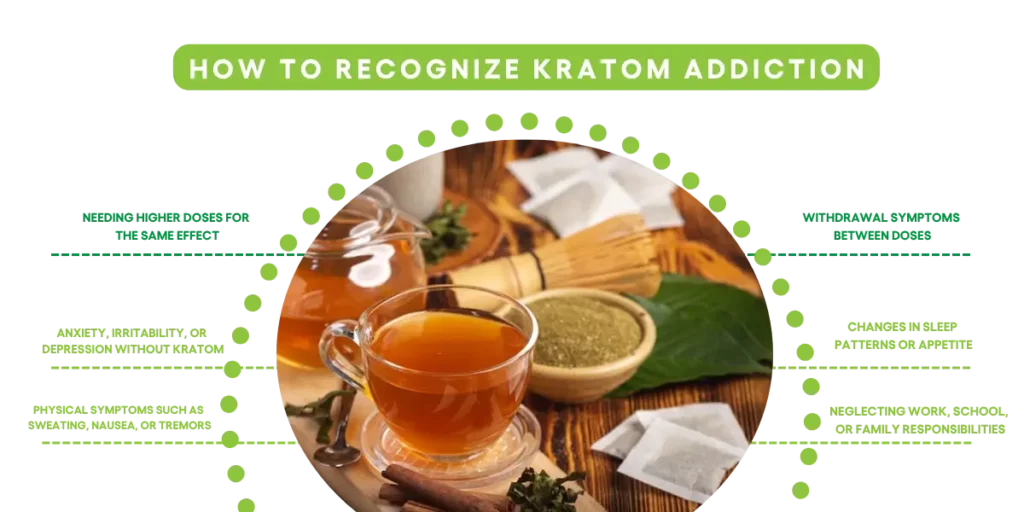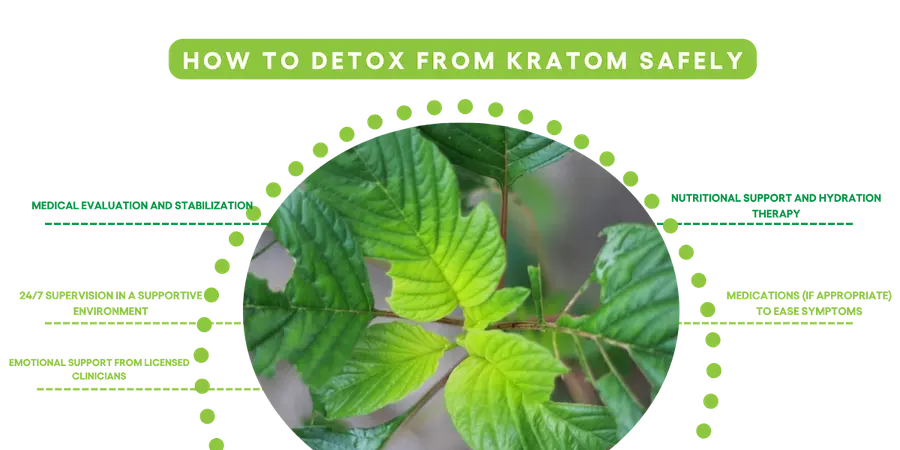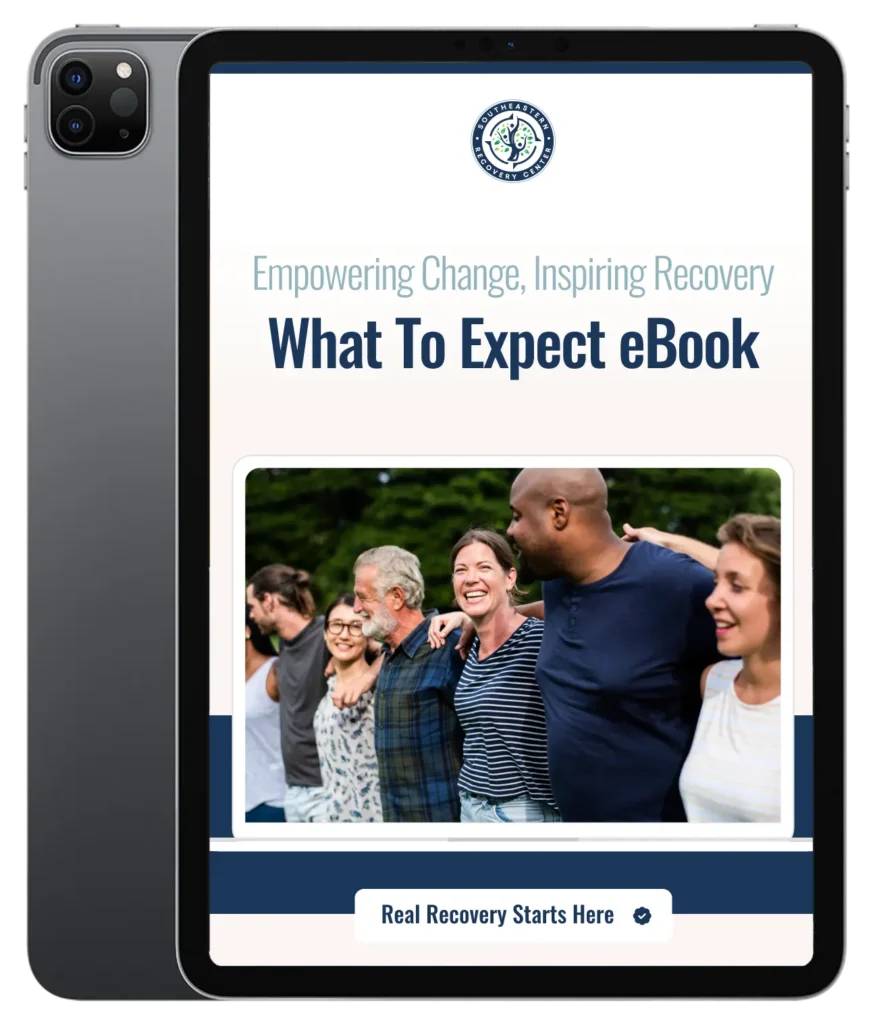Kratom addiction is a growing concern across Charlotte and throughout North Carolina, quietly affecting individuals who may have turned to the substance seeking relief from pain, anxiety, or fatigue. While kratom is often marketed as a “natural” or “safe” alternative to opioids, the reality is more complex, and often dangerous.
At Southeastern Recovery Center in Charlotte, NC, we provide comprehensive, compassionate treatment for kratom addiction. Our programs are designed to help individuals safely detox, understand the root causes of addiction, and build lasting recovery with support from a dedicated clinical team.

Kratom (Mitragyna speciosa) is a tropical tree native to Southeast Asia. Its leaves contain active alkaloids, mainly mitragynine and 7-hydroxymitragynine, which bind to the same opioid receptors in the brain as substances like morphine and fentanyl.
At lower doses, kratom can act as a stimulant, increasing alertness and energy. At higher doses, it can have sedative or euphoric effects. This dual action is part of what makes kratom so unpredictable and addictive.
Because it interacts with opioid pathways, the body can quickly develop tolerance and dependence. Users often need more kratom to achieve the same effect, leading to a cycle of withdrawal and craving similar to traditional opioids.

While the public health spotlight has been focused on the opioid epidemic, kratom has emerged as an unregulated but significant problem, especially in North Carolina, where accessibility remains high.
Here’s why this matters locally:
Although kratom is still legal in North Carolina, the state has begun reviewing its regulation. In 2023, lawmakers introduced bills proposing stricter age limits and labeling standards, similar to measures already adopted in neighboring states like Georgia. These steps reflect growing awareness that unregulated kratom use can cause real harm.
If you or someone you love in Charlotte, NC, is struggling with kratom dependence, it’s important to know that help is available and recovery is absolutely possible.

For many people, kratom use begins innocently. Someone might try it to relieve back pain, boost energy, or reduce anxiety. Some even use it to manage withdrawal from prescription opioids. But because kratom affects the same neural pathways as opioids, tolerance builds quickly, and dependence follows.
Once the body adapts to regular use, stopping suddenly can cause withdrawal symptoms. That’s often when people find themselves stuck: taking kratom not to feel good, but just to avoid feeling bad.
In Charlotte and across North Carolina, we’ve seen an increase in clients who began with occasional kratom use and found themselves unable to stop without professional help.
Recognizing the signs of kratom addiction can be difficult, especially since many believe it’s harmless. Here are some common red flags:
If you notice these patterns, in yourself or someone else, it’s time to seek professional support. Southeastern Recovery Center offers medical detox and therapy programs in Charlotte designed specifically for kratom and other emerging addictions.

Detoxing from kratom can be uncomfortable, but with the right care, it’s absolutely manageable. Trying to quit “cold turkey” at home often leads to intense withdrawal symptoms such as muscle aches, insomnia, fatigue, and emotional distress, which can quickly trigger relapse.
At Southeastern Recovery Center, our medically supervised detox program helps clients safely and comfortably eliminate kratom from their system. Our medical team provides continuous monitoring, symptom management, and hydration support to minimize discomfort and prevent complications.
By addressing both the physical and psychological sides of detox, we help clients start their recovery on stable ground.
Kratom withdrawal symptoms generally begin 12 to 24 hours after the last dose. Most people experience the worst symptoms between days two and four, with physical effects typically resolving within a week.
However, emotional and psychological symptoms, such as anxiety, depression, or cravings, can persist longer. That’s why detox alone isn’t enough. Comprehensive treatment following detox is critical to prevent relapse and support long-term healing.
At our Charlotte facility, clients receive continued support through therapy, counseling, and relapse prevention programs as soon as detox is complete.
At Southeastern Recovery Center, our approach to kratom addiction treatment is both scientific and compassionate. We understand that addiction doesn’t happen in isolation, it’s influenced by mental health, trauma, lifestyle, and environment.
Our treatment programs include:
Each treatment plan is personalized, ensuring that every client receives the care that fits their needs, goals, and pace.
Addiction impacts the entire family, and family support can play a significant role in recovery success.
Families in Charlotte and throughout North Carolina can help by:
At Southeastern Recovery Center, we provide family programs that help loved ones rebuild trust, improve communication, and create a shared understanding of recovery.
Recovery doesn’t end when treatment does, maintaining sobriety requires ongoing support and structure.
Our relapse prevention planning helps clients in Charlotte and across North Carolina stay grounded through:
Relapse is not failure, it’s a signal that additional support may be needed. With the right guidance, long-term recovery from kratom addiction is absolutely achievable.
Finding the right treatment center in Charlotte, NC, or elsewhere in North Carolina, can feel overwhelming. Here are key factors to look for:
At Southeastern Recovery Center, we meet all of these criteria and more. Our focus on integrity, compassion, and clinical excellence has made us one of North Carolina’s most trusted recovery providers.
From your first phone call to the day you graduate from treatment, our team provides step-by-step support.
Our mission is simple: to provide the highest level of care possible so that every client leaves stronger, healthier, and ready to thrive.
At Southeastern Recovery Center, we believe recovery is more than sobriety, it’s rebuilding life with purpose and clarity. Our Charlotte-based facility provides a safe, welcoming space where clients can focus fully on healing.
We serve individuals from Charlotte, Concord, Gastonia, Huntersville, and throughout North Carolina who are seeking trusted, compassionate care for kratom addiction and other substance use disorders.
Our experienced team, state-of-the-art facility, and commitment to personalized care make us a leading choice for those seeking freedom from kratom addiction in North Carolina.


If you or a loved one are interested in learning more about what to expect when getting help for drug or alcohol addiction, please fill out our brief form and download the eBook. You can also give our admissions team a call & we would be happy to answer any questions you may have. Help is only a call away!

Yes, kratom is currently legal in North Carolina, but lawmakers are considering regulations to address safety and misuse concerns.
Yes. Kratom withdrawal may include muscle aches, irritability, anxiety, insomnia, and cravings, similar to mild opioid withdrawal.
Kratom can remain in the body for several days depending on dosage, metabolism, and frequency of use.
While not always required, medical detox is strongly recommended for comfort and safety, as withdrawal can be unpredictable.
Therapies like CBT, Motivational Interviewing, and trauma-informed care are most effective for treating kratom addiction and related mental health issues.
Most major insurance plans cover treatment for kratom and other substance use disorders. Our admissions team can verify your benefits quickly and confidentially.
We combine medical expertise, individualized care, and compassion, offering detox, therapy, and aftercare under one roof in Charlotte, NC.
If you or a loved are struggling with kratom addiction, please reach out to our team today. Many treatment centers take a one-size-fits-all approach when treating addiction which isn't effective...At SERC, we understand that each client has their own story which led them to seeking help. We put emphasis on individualized care, tailoring treatment based on the specific needs of each client.

Reach Out For Help! ⮕

Create A Recovery Plan! ⮕

Begin The Healing Process! ⮕